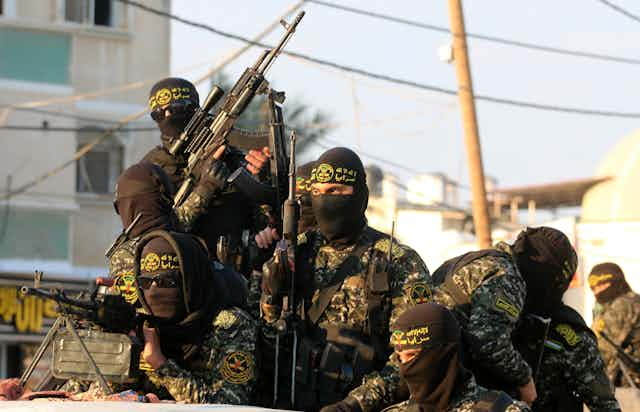A missile struck Al-Ahli Arab hospital in Gaza City on October 17 2023, killing 471 Palestinians – according to the Hamas-run health ministry. Palestinians blamed an Israeli airstrike, while Israel blamed the Palestinian Islamic Jihad (PIJ) militant group.
Since 1984, PIJ has been carrying out armed attacks against Israel. The group also participated in the October 7 Hamas-led attack on Israel, which resulted in the deaths of 1,200 people and the kidnapping of a further 240.
But, despite being the third-largest Palestinian organisation, PIJ remains less known than Hamas. The popular image of PIJ is often that of a terrorist group operating in the shadow of Hamas and bent on destroying Israel with the support of Iran.
In this article, I dispel three misconceptions about PIJ: its dependency on Hamas, its radicalism and its ties with Iran.
Read more: Why did Hamas attack, and why now? What does it hope to gain?

In the shadow of Hamas?
PIJ does occasionally coordinate its military actions with Hamas. But the group does not operate in the shadow of Hamas and often acts independently.
Both groups emerged as an offshoot of the Muslim Brotherhood, an organisation founded in Egypt in 1928 that advocated for the application of Islamic law in all aspects of society. However, their identities and strategies diverge.
Hamas was born as a social movement with political and military aspirations, while PIJ emerged primarily as an armed group. As a result, PIJ has never been interested in providing social welfare programmes or participating in elections (though an election has not been held in the Gaza Strip since 2006). Its role is limited to armed resistance.
This doesn’t imply that PIJ has no interest in politics. Rather, it believes it is premature to focus on political power until a full Palestinian national sovereignty, free of “foreign” occupation, is established.
PIJ and Hamas are united in the war against Israel. But tensions between the two often simmer beneath the surface, reflecting a delicate balance between cooperation and competition.
A few days before the October 7 attacks, PIJ organised a military parade to celebrate the 36th anniversary of the organisation’s founding. During the event, it showcased new models of self-manufactured weapons, reflecting the recent growth of its military capabilities in Gaza and its independence from Hamas.
The most radical faction?
PIJ rejects political compromises and sees violence as the only possible means of defeating Israel. The group rejected Hama’s proposal in 2006 for a long-term truce with Israel. But PIJ is less dogmatically radical than one might assume.
Unlike Hamas, PIJ has never patrolled the streets of Gaza to persecute “deviant” behaviour or impose strict Islamic morals on the local population. And, while PIJ vehemently opposes the Palestinian Authority (the self-governing body that has limited rule over parts of the occupied West Bank), the group refrains from violent clashes with its dominant political party, Fatah.
PIJ maintains cordial relations with all Palestinian political forces and often positions itself as a mediator between Fatah and Hamas.
Throughout the repeated cycles of violence with Israel, there have even been instances when PIJ has temporarily softened its stance. In the past, the group has discussed the possibility of limiting its armed struggle to the goal of liberating the Palestinian territories occupied by Israel in the six-day war of 1967, rather than to the total destruction of Israel.
This stance may not align with the official manifesto, but it reflects strategic efforts to maintain a unified national programme that would be supported by more moderate factions. According to PIJ, internal disagreements would only benefit the enemy.
PIJ has adopted an official position of neutrality over various regional conflicts to avoid upsetting anyone and to keep Palestinian issues outside the dangers of regional sectarianism. For example, during the war in Syria, which began in 2011, Hamas has gradually severed its ties with the Syrian regime and supported the popular revolts. PIJ, on the other hand, has refused to take a side.
An Iranian proxy?
The Islamic Republic of Iran has long articulated support for the Palestinian cause. It has cultivated relations with groups across the region who position themselves against Israel and the US.
PIJ does receive significant financial and military support from Iran. However, there is a distinction in religious ideologies – the Sunni PIJ does not share religious affinities with Shia Iran. So, PIJ’s role in the Israeli–Palestinian conflict should not be reduced to a puppet under Iran’s control.
When delving into PIJ’s writings, one may be surprised by the geopolitical analysis offered by its leaders. Rather than relying solely on religious rhetoric, they consistently frame the conflict as an asymmetrical power struggle against an occupier state considered an outpost of western colonial powers.
From this perspective, PIJ regards Iran as a source of inspiration. In 1979, the Iranian revolution successfully overthrew the country’s west-friendly regime and subsequently severed ties with Israel.

But, despite oaths of loyalty to the Iranian regime, there have been times when the honeymoon between PIJ and Iran has suffered setbacks. PIJ refused to support the Houthi rebels in the ongoing Yemen civil war, causing Iran to temporarily cut off its funding.
PIJ today finds itself financially dependent on Iran. But the Iranian regime does not control its military actions.
PIJ has emphasised that its armed struggle is specifically directed at Israel and not the west. As a result, it has refrained from engaging in terrorist attacks outside Palestinian territories and Israel.

